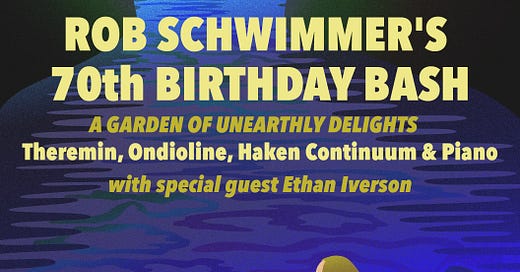Looking forward to joining the great Rob Schwimmer for his birthday gig on Thursday.
One of Rob’s theremin specialties is an obscure song by Erich Wolfgang Korngold: "In meine innige Nacht" from Drei Gesänge Op.18.
I’ve read some hard music in my time, but there’s something about "In meine innige Nacht" that is really counterintuitive. Each time I play it for Rob I have to relearn it, note by note. Did Korngold invent a new harmonic language for this strangely beautiful song?
As far as both Rob and I know, this work is one of a kind. Most of Korngold — while always pretty great — is nowhere near this unexpected in terms of vertical sonorities. Rob jokes that it is “The love child of Olivier Messiaen and Chick Corea.” He first heard the piece on a record by Anne Sofie von Otter, who made several top-shelf DG recitals with Bengt Forsberg.
Just recently I learned that Korngold could be heard playing piano, accompanying legendary violinist Toscha Seidel in Korngold’s interludes for a 1920 stage production of Much Ado About Nothing. This is the harmonic language I mainly associate with Korngold, including his film work and the famous Violin Concerto. Korngold and Seidel have exquisite rubato rhythm, and the pianist changes his part a bit on the fly. All four movements have marvelous moments; someone even made a scrolling score of the third movement, perhaps because Seidel makes the most of a simple theme.
Korngold was a practical composer, perhaps too practical. There can be an element of pastiche. He was a prodigy, commissioned early on by many major theaters before settling into becoming one of Hollywood earliest and greatest musicians. If Korngold had followed a slightly more obstinate and obscure path — a path suggested by "In meine innige Nacht” — would more of his music be in the active concert repertoire today?
Korngold was practical, but he was also an elite symphonic composer, essentially untouchable by those who hired or admired him.
Today so much of our culture is decided by committee at a corporation. Even the fans have a vote on the committee; at times the fans even steer the committee. Monia Ali is currently writing fascinating essays on this topic at Fandom Exile.
Yesterday, Ali posted about the greatest TV show of all time, Buffy the Vampire Slayer. While I am a minor expert in Buffy thanks to frequent viewings with Sarah, I have never been part of Buffy internet fandom. As is the case with most fandoms, the Buffy fandom seems patently childish and self-referential. Ali supplied a marvelous graphic from “Bespangled” that satirizes the fandom: horny adolescent social justice warriors in passionate debate about how one might interpret the fantasy love life of vampires.
I knew the fandom was bad, but I didn’t realize they were so active when Buffy was actually on the air. Ali’s rundown on this juicy piece of history reveals how show runner Joss Whedon interacted with his obsessed audience:
Writers—including Whedon himself—would frequent the boards to take the temperature of fans’ opinions and receive their criticism and praise. This did influence the show, but not in the way one might expect. Writer Jane Espenson said reading what the fans said, “did affect the show sometimes; if we saw that a lot of people had guessed where we were headed, we could change it.”
In present day, executives paying attention to fandom often leads to them bending to their wishes, so it makes sense that you would expect this crew to operate the same way. But that’s not how Whedon operated. In a way, he engaged in reverse fan service, intentionally delivering pain and heartbreak, and was frequently referred to as evil by his fans.
Whedon was known for wielding a monkey’s paw approach to audience desires, giving you exactly what you wanted, either when you didn’t want it anymore or in a way that made it beyond unappealing.
I left a comment on Ali’s post:
I'm way behind on these topics, so forgive a banal observation, but I was so disappointed in Ted Lasso. Lasso was great for a season, but then every character became good or understandable: there were no antagonists. It seemed like they started making Lasso for fans who loved every character.
How wonderful that Joss Whedon read what the fans wanted -- and refused to honor their hyper-banal requests! Fans are dumb. Never listen to the fans. Buffy went on too long but the big needle drops of plot were never the problem, the show just ran out of gas, and no wonder, there were 144 episodes for goodness sakes. Whedon was already my hero, and I respect him even more having read your post.






Wow, that Korngold song is a revelation. (And seemingly sight-reading-proof, LOL...) Also, Buffy forever #oncemorewithfeeling
Nice post, Ethan. Harmonies at the beginning of Drei Gesänge could be also Strayhorn & Dukeish.
Paralel half tone shift is Herbie.
Very interesting.